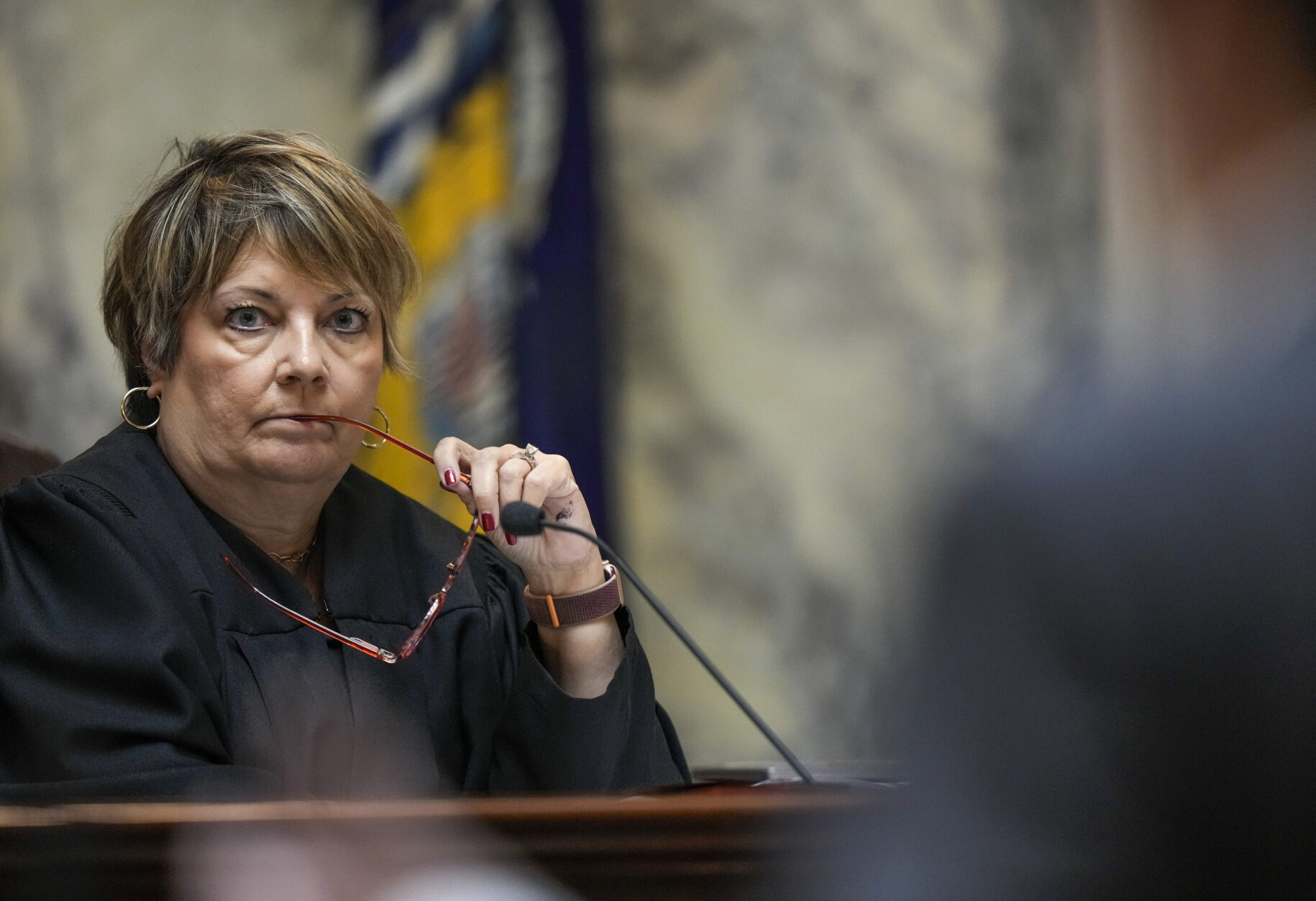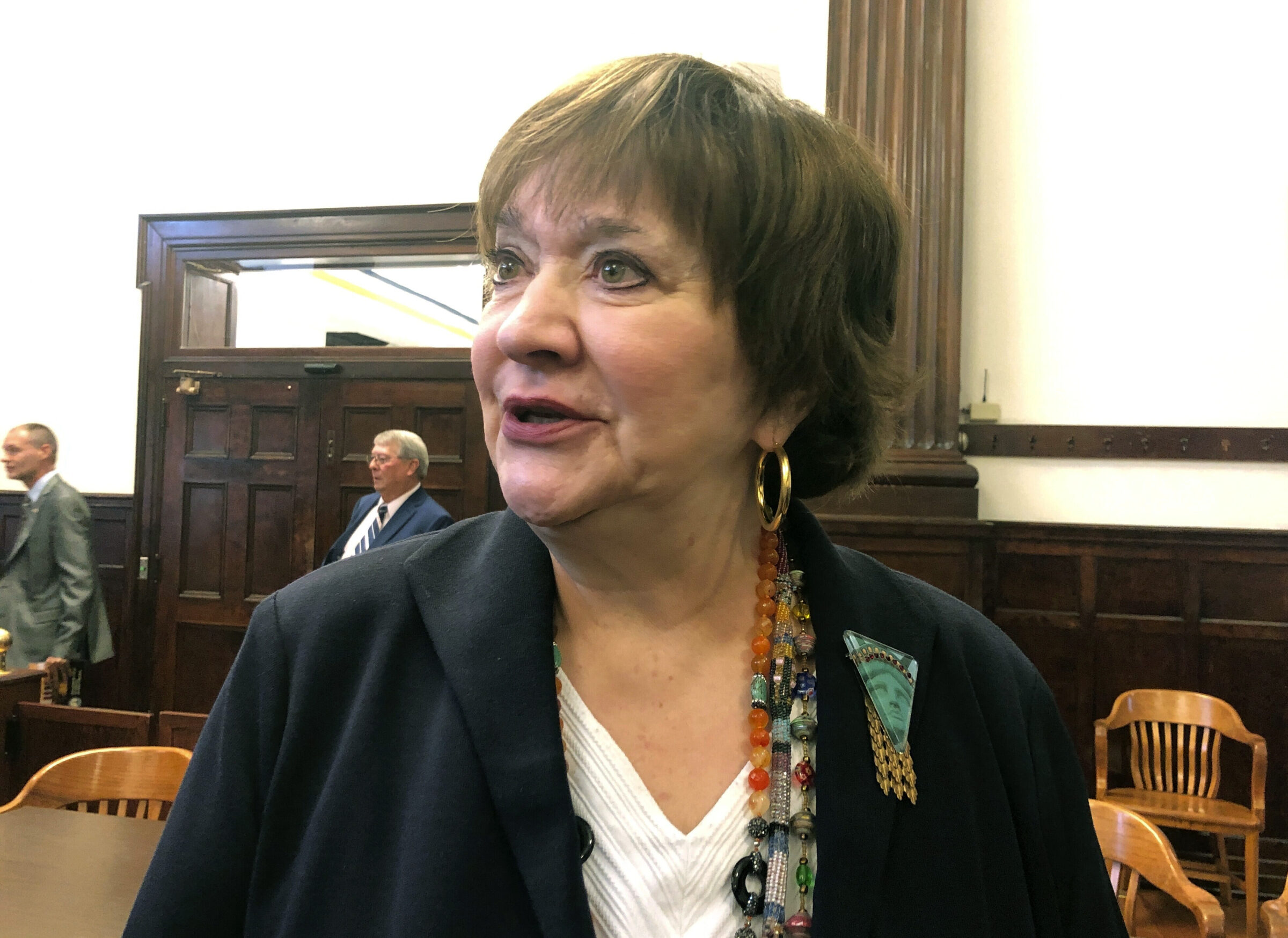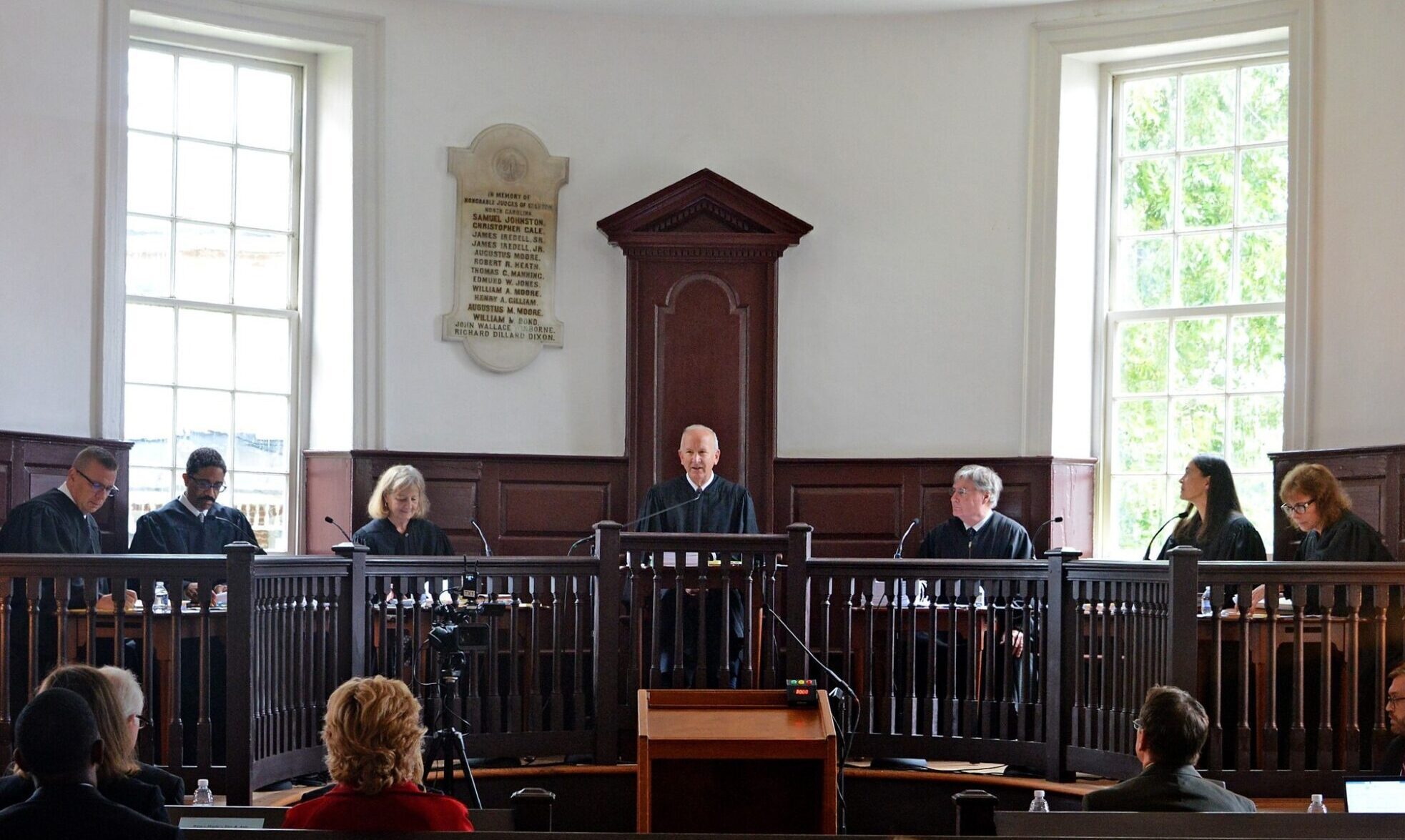With Impeachment Push, Wisconsin GOP Tests Bounds of Political Power
GOP threats to impeach Justice Protasiewicz blow past the constitutional guardrails over the process, but courts may be reluctant to step in. Democrats have some leverage, though.
Daniel Nichanian | September 22, 2023


Margaret Workman is watching Wisconsin Republicans threaten Justice Janet Protasiewicz with impeachment from several states away. But she can relate to Protasiewicz like very few can.
Workman sat on West Virginia’s supreme court in 2018—one of the three Democratic justices in the court’s majority—when Republican lawmakers decided to impeach that entire court. The GOP had flipped the legislature in 2014 for the first time in decades, and it had seized the governorship in 2017; only the supreme court stood in the way of one-party rule in the state.
“All of a sudden, we had this right-wing legislature wanting to impeach everybody,” she recalls, “and they wanted in my opinion to get rid of us so they could put their own.”
When Workman read this summer that Protasiewicz may be impeached, shortly after her victory flipped Wisconsin’s high court to the left, she was struck by the parallels with what she herself went through. “The Wisconsin situation is a complete power grab to undermine democracy,” she told Bolts. “It shocks me because it even goes further than the one that I experienced.”
She added, “It’s this whole thing that’s scary going on in this country, that if you can’t defeat people’s votes then you do it in some other way.”
Protasiewicz won Wisconsin’s supreme court election in April, giving liberals a 4-3 majority on the court, their first in 15 years. But Republicans began to float impeaching Protasiewicz before the results were even known. The party has already locked down control of the legislature, using aggressive gerrymanders to protect itself from election defeats. It has also deflated the powers of the Democratic governor, Tony Evers, undercutting his authority to appoint people to executive branch positions.
But by electing Protasiewicz, voters threatened the GOP’s hold on power by opening the door to an anti-gerrymandering ruling by the court. Just days after Protasiewicz was sworn-in, voting rights groups filed two lawsuits asking for the state’s legislative maps to be struck down as unconstitutional gerrymanders.
Speaker Robin Vos, former Governor Scott Walker, and other Republicans have demanded that Protasiewicz recuse herself from these cases or else risk impeachment. They say comments she made while running—she notably called the state’s current legislative maps “rigged”—mean that she has “prejudged” the cases. Candidates in Wisconsin routinely share views on issues or are attached to political parties, though, and the Wisconsin Judicial Commission dismissed complaints filed by the GOP that her statements violated ethics rules.
Vos, who leads the Assembly, where impeachment proceedings would start, is still pushing forward this month. Thanks to the large majorities the state’s gerrymandered maps have delivered the GOP, his party currently holds enough seats to impeach Protasiewicz in the Assembly and then convict her in the Senate if all Republican lawmakers hold together.
Removing Protasiewicz would go far beyond the legal guardrails for impeachment laid out in the state constitution. Legal experts in Wisconsin say a plain reading of the document undermines the Republicans’ case against Protasiewicz.
But these legal barriers may not constrain the GOP. Constitutional protections are only as strong as the will to enforce them. Republican lawmakers may try to blow past them even if there is little legal justification, because at that point it’s uncertain at best who or what could stop them.
Most notably, the allegations against Protasiewicz do not seem to fit the circumstances under which Article VII of the state constitution contemplates impeachment: It reserves it for “corrupt conduct in office, or for crimes and misdemeanors.” Protasiewicz is not accused of criminal conduct, she has yet to do much of anything “in office,” and she faces no allegations of bribery or personal gain, which is traditionally how corruption was defined.
“It’s a difficult fit with the historical understanding of corrupt conduct in office,” says Chad Oldfather, a professor at Marquette University Law School. “You are talking about a justice being impeached before even hearing or deciding a case,” says Doug Keith, senior counsel in the Brennan Center’s Judiciary Program, a national program that tracks state courts. “This is not how impeachment has been used, or how I would expect it to be used.”
In fact, Wisconsin has a separate procedure, known as “removal by address,” allowing lawmakers to remove judges for “misconduct”—a broad category that would better fit the GOP’s charges against Protasiewicz. Republicans lack the votes for the far higher threshold that this procedure requires in the Assembly (two-thirds, rather than a simple majority).
But Keith added that this may not matter in practice to how this confrontation unfolds, saying, “it’s a separate question of what would happen if the legislature followed through on this.”
Miriam Seifter, a professor at the University of Wisconsin-Madison Law School, also says she does not think that the allegations against Protasiewicz meet the constitutional standards of impeachment, but she too warns that lawmakers may decide they don’t care, betting that no one will check them.
“That is one of the precarious aspects of this situation,” says Seifter, “once one legal actor does not adhere to the constitution, it’s hard to predict the rest of the legal trajectory.”
A lawsuit would likely follow Protasiewicz’s impeachment, but it’s unclear whether any judge would agree to even consider if the charges against her fit the circumstances laid out in Article VII. Courts have typically deferred to lawmakers on impeachment, treating it as a “political question” that is not subject to judicial review, Oldfather and several other legal experts told Bolts. Still, Oldfather also said there is no telling how that question would go in Wisconsin because there’s virtually no precedent in Wisconsin’s court system. (No public official has been impeached in Wisconsin since 1853.)
Even if courts agreed to review the articles of impeachment, the core effect of the GOP’s actions is to affect who sits on the highest court—targeting who gets to even interpret the constitution in the first place. Protasiewicz recused herself this month from a lawsuit asking the state supreme court to block attempts by the legislature to impeach her, signaling that liberals have already lost their edge on the supreme court for cases that touch on her removal.
“It’s a legal question that’s to a greater extent than most floating in this sea of politics,” says Oldfather on the matter of whether impeachment is an appropriate response to the accusations against Protasiewicz.
Vos, the state Speaker, did not respond to a request for comment on these constitutional concerns. On Sept. 13, he said he was setting up an advisory panel made up of former supreme court justices to consider when a justice can be impeached. One of the members is a former conservative justice and former Republican lawmaker who donated to Proasiewicz’s opponent.
West Virginia’s GOP in 2018 similarly tested the bounds of their power once they had the votes. “Impeaching the entire court was entirely political,” says Robert Bastress, professor at the West Virginia College of Law, “it was motivated by Republicans who had just recently taken over the legislature, and they were flexing their muscle.”
The overhaul of West Virginia’s supreme court dates back to 2018, when Chief Justice Allen Loughry, a Republican, was federally indicted on fraud and witness tampering charges that stemmed from allegations of him using state funds for his personal enjoyment and spending excessive amounts of money on furnishing his office. A concurrent fraud scandal also engulfed Justice Menis Ketchum, a Democrat. By mid-2018, Ketchum had pled guilty in a federal case and resigned, and Loughry was suspended from the court.


But Republicans also went after the remaining members of the supreme court, alleging in part that they were all responsible for the court’s insufficiently clear ethics policies.
“They had very good reasons for impeaching two of the justices—two of them were convicted of federal felonies—there were no grounds for impeaching the other three,” Bastress says.
Workman stood her ground after her impeachment and fought the proceedings until a panel of state judges blocked the Senate from holding a trial and ruled that the legislature was violating procedural requirements in its impeachment proceedings. The state Senate, which by then had acquitted the GOP chief justice and was gearing up for a trial against Workman, fought the ruling but the U.S. Supreme Court let it stand. As a result, Workman got to stay on the court, though she then chose not to seek re-election in 2020.
But by the time a court intervened to stop West Virginia’s impeachment trials, another Democratic justice, Robin Davis, had already chosen to resign rather than let the proceedings against her drag out. To replace Davis, Governor Jim Justice appointed Evan Jenkins, one of the state’s Republican U.S. representatives.
“What the legislature was attempting to do was to stack the court with what I would call their puppets,” Davis told Bolts. “They were hell bent on getting control of the court.” She says she did not want to participate in what she viewed as “a very unfair, highly political proceeding.”
Unlike West Virginia in 2018, Wisconsin is a closely divided swing state with obvious stakes for national politics, making it likely that a judicial impeachment would receive far more attention and become a magnet for fundraising and political activism. That also gives Democrats an additional avenue to respond: activating public opinion.
In an interview with Bolts, Ben Wikler, chair of the Wisconsin Democratic Party, stressed that he is focused on putting pressure on Republican lawmakers. Democrats have also launched a multimillion-dollar campaign to air ads on this situation.
“Our number one goal in the first phase of this fight is to make sure that every Wisconsin voter knows Republicans are threatening to overturn the election, and to encourage them to contact their legislators to let them know how they feel about it,” Wikler says. “It’s going to remind voters exactly why they voted for Democrats in the midterms and threw out Trump in the first place, which is that the Wisconsin Republicans are a clear and present danger to democracy.”
Politically-speaking, Democrats’ strongest asset in the confrontation over their new supreme court majority is the governor’s mansion: If Republicans manage to remove Protasiewicz, Evers would have the power to appoint a new justice to fill the vacancy, and he would presumably pick another liberal-leaning justice to replace her.
Vos and his allies may still be thinking it’s worthwhile to float impeachment because the threat alone could persuade Protasiewicz to bow to their demand and recuse herself on at least redistricting cases; Protasiewicz has not at this stage indicated what she would do. In addition, if they do impeach and convict Protasiewicz before Dec. 1, it would trigger a special election in 2024, giving conservatives a shot to flip back the court next year.
Still, even if there is an election in 2024, Evers’ interim appointment would sit on the court for long enough that the court would have time to strike down gerrymanders.
To tie Evers’ hands, Republicans may turn to a very aggressive maneuver. If the Assembly impeaches Protasiewicz, it would suspend her and therefore deprive liberals of their majority until the Senate holds a trial that results in either an acquittal or conviction. But the Senate could indefinitely delay trial on the articles of impeachment and keep Protasiewicz sidelined without allowing Evers to appoint a replacement. The state constitution sets no timeline for how quickly the Senate has to take up articles of impeachment.
“It’s one of those situations where the constitution assumes good faith, regularity of proceedings, and doesn’t spell it out,” Oldfather says.
Protasiewicz could still try to sue to force a resolution, some legal observers say. But here again, she and state Democrats also have political leverage that may prove more important than possible lawsuits.
At any moment, Protasiewicz could break the logjam by resigning, allowing Evers to appoint a replacement even if at a personal cost to her. In a bizarre twist due to the particularities of state law regarding the timing of elections (there can be no more than one supreme court seat on the ballot on any given year), if Protasiewicz resigned on or after Dec. 1, Evers’ replacement appointee would get to serve until 2031 without facing an special election (seats on the court are currently scheduled for re-election each year from 2025 to 2030)—hardly an appealing prospect for the GOP.
Seifter, the University of Wisconsin professor, also envisions a scenario in which Evers could claim the authority to appoint a justice if the Senate is delaying a trial.
“It’s hard to say how the courts or other actors will respond in this unprecedented situation,” says Seifter. “For example, the governor could declare that the legislature’s inaction creates a temporary judicial vacancy, or a court—whether the high court or a lower court—could reject the holdup as an encroachment on the judicial function. There isn’t clarity at this point on who would have the final word.”
Republican lawmakers this week also introduced articles of impeachment this week against the state’s elections chief, Meagan Wolfe, whom they have been aiming to fire all summer. The charges against Wolfe stem largely from conspiracies about the 2020 presidential election that have been debunked. Either Protasiewicz or Wolfe would be the first Wisconsin official impeached in roughly 170 years.
Such extraordinary events, if they unfold in coming months, may also ratchet up what other politicians are willing to consider in other states. Republican lawmakers in Montana, Ohio, and Pennsylvania in recent years have talked about impeaching state supreme court justices whose decisions they disliked, but have ended up not moving forward.
“You see states learning from one another and adopting the strategies that legislators have found successful in other states to gain an upper hand in their courts,” says Keith of the Brennan Center. “And so if this happens in one state, I would not be surprised to see other states follow.”
Sign up and stay up-to-date
Support us
Bolts is a non-profit newsroom that relies on donations, and it takes resources to produce this work. If you appreciate our value, become a monthly donor or make a contribution.




